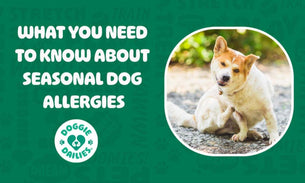Does your dog seem more tired than usual, constantly itching, or sneezing while sniffing around outside? Just like us, dogs can suffer from seasonal allergies. Whether it’s pollen, grass, or mold, springtime allergies can cause your furry friend discomfort. But don’t worry—there are ways to help them feel better and enjoy the sunny days ahead!
What Causes Seasonal Allergies in Dogs?
According to the National Animal Supplement Council, seasonal allergies in dogs occur when their immune system reacts to common environmental allergens like pollen, grass, and mold. Though not life-threatening, these allergies can cause your dog considerable discomfort. When your dog is exposed to allergens, their immune system releases histamines, leading to symptoms like itching, sneezing, and inflammation.
- Pollen
- Grass
- Weeds
- Mold
- Fungi
- Flea saliva
Signs Your Dog Has Allergies
It’s important to recognize the signs of allergies early so you can treat them. Dogs may show different symptoms compared to humans, and it’s crucial to be aware of what to look for:
- Sneezing
- Watery eyes
- Runny nose
- Congestion
- Flaking and itching (pruritus)
- Ear infections
- Scratching at one or both ears
- Shaking their head
- Smelly or dirty-looking ears
- Excessive licking of the paws and anus
- Patchy skin or skin abnormalities
The Americal Kennel Club (AKC) notes that skin allergies are the most common allergic reaction in dogs. If you notice any of these signs, it’s best to consult with a vet to determine the cause and the best course of action.
Natural Remedies for Dog Allergies
While you can’t completely eliminate your dog’s allergies, there are several natural remedies that may help alleviate symptoms:
- Fatty acid supplements: Omega-3 fatty acids, like those found in salmon oil, help soothe itchy skin and support a healthy coat.
- Antioxidant support: Treat your dog with antioxidant-rich supplements, such as those with wild Alaskan salmon oil and krill oil, to support skin health. We recommend our skin & coat soft chews that contain Wild Alaskan Salmon Oil for dogs, Krill Oil for dogs, Coconut Oil for dogs, Biotin for dogs, and Vitamin E for dogs that help support healthy skin and create a glossy coat.
- Regular baths: Use hypoallergenic shampoos to wash away pollen and other allergens from your dog’s coat. Make sure to choose a soap-free formula that’s gentle on their skin. A 2-in-1 shampoo and conditioner can help relieve dry, itchy skin. The Doggie Dailies formula contains a special blend of conditioners and moisturizers that work together to provide much-needed relief for dry, itchy skin. It's important to look for soap-free dog shampoo, which is safe for routine use on dogs and puppies. It will also provide relief without disrupting topical flea preventatives.
- Regular ear cleaning: Regular ear cleaning with a natural ear wash can help reduce ear infections caused by allergens. Doggie Dailies Ear Wash is made with a powerful combination of aloe vera, tea tree oil, witch hazel, and echinacea that safely loosens and removes dirt, ear wax, and debris from your pet's ears, leaving them clean, fresh, and feeling great. Depending on your dog's demands, Doggie Dailies ear treatment for dogs is safe to apply regularly.
How to Prevent Your Dog’s Allergies from Getting Worse
Unfortunately, allergies don’t have a cure. However, you can manage your dog’s symptoms with a few preventive measures:
- Keep your dog indoors when pollen counts are high.
- Bathe your dog regularly to remove allergens.
- Use hypoallergenic bedding and wash their toys regularly.
Spring into the Season with a Happy Dog
Springtime doesn’t have to mean allergy misery for your dog. By recognizing the signs of allergies, taking steps to reduce exposure to allergens, and using natural remedies, you can help your dog enjoy the season without the discomfort of seasonal allergies. Talk to your vet for personalized advice and consider adding allergy supplements to your dog's routine to help them stay healthy and happy.








